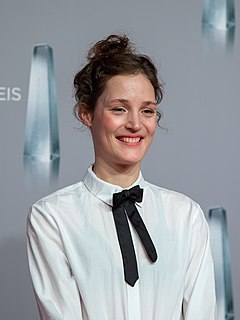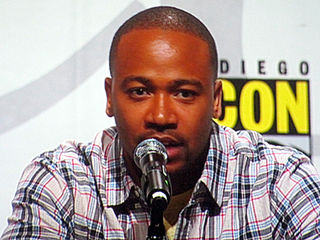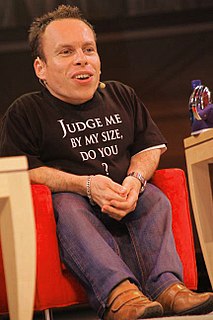A Quote by Marya Hornbacher
Somewhere in the back of my brain there exists this certainty: The body is no more than a costume, and can be changed at will. That the changing of bodies, like costumes, would make me into a different character, a character who might, finally, be alright.
Related Quotes
For me, the costume is very important. More the feel of it than the look of it. I take it more from the inside. So if I wear something that's heavy, it will affect my character. Is it very tight, and do I feel almost imprisoned, or is it very comfortable? It's the feeling of the costume that tells me where to go with the character.
Every movie I work with the costume designer to see what feels like the character, not what Columbus would wear but what is right for the character. Outside of the armored truck standard issue security guard uniform, this guy is trying to make ends meet. He might have one pair of jeans, the same boot, maybe changes his shirt but he doesn't have a walk-in closet full of things, so I wanted something comfortable that felt like the character.
Becoming the character you are playing might work for some, but for me, it doesn't. I always maintain a gap between myself and my character because if I will go so deep into it, it will get difficult for me to come back. You should work towards understanding the psyche of your character and then play it.
I don't write a whole lot about one person that exists in reality; it's usually characteristics of different people that I combine into a character. I tend to think through and try and make characters behave in a natural way. I follow the character and think about what they would do, what decisions they would make.
There were two things that became apparent, pretty quickly into the process. One was that the muscles didn't take as much reconditioning as I thought they would. It was more like voice acting than I thought it would be. You're using your whole body and there are things that are different, but when you are doing a character, even in the booth, nobody is watching but my face will do different things when I do different characters.
Costume is always an asset. Normal costume you have a lot to say about - if you're wearing suits or ties, and what color you want, and how it's going to be cut, and stuff like that, and whether or not you're going to wear a hat, and blah, blah, blah. But, when you're wearing a special costume, and of course, costume is probably the second ingredient in character, script being first, I always find that the costume does a lot to cement your character, to put it firmly in mind.
It would seem that if despotism were to be established among the democratic nations of our days, it might assume a different character; it would be more extensive and more mild; it would degrade men without tormenting them. I do not question that, in an age of instruction and equality like our own, sovereigns might more easily succeed in collecting all political power into their own hands and might interfere more habitually and decidedly with the circle of private interests than any sovereign of antiquity could ever do.
There are more similarities than differences when it comes to preparation of a performance. You're using some lyrics, you have a relationship with them, they apply to different parts of your life and different circumstances, different memories, different stories you have in your head. You form personal relationships with the song. I think that's very similar, in a way, to prepping a character. You pour your own personality, in a sense, into the character, you sympathize with a character in a way that's similar to the way you might sympathize with a song.
I signed 'Iss Pyaar Ko Kya Naam Doon' only for a year. But the producer requested me to stay on, as the show had just started to make money. I carried on, and in the process, the character became very popular. When I finally gave up, changing the actor for that character was difficult, so the show ended.
Man is more courageous, pugnacious, and energetic than woman, and has a more inventive genius. His brain is absolutely larger, but whether relatively to the larger size of his body, in comparison with that of woman, has not, I believe been fully ascertained. In woman the face is rounder; the jaws and the base of the skull smaller; the outlines of her body rounder, in parts more prominent; and her pelvis is broader than in man; but this latter character may perhaps be considered rather as a primary than a secondary sexual character. She comes to maturity at an earlier age than man.
I'm very much into the costuming of any character that I portray and it's one of the great things about making movies is it's a collaborative art form so you get all these artists who are looking specifically about for this instance your character's costume and what that might tell about your character.



































